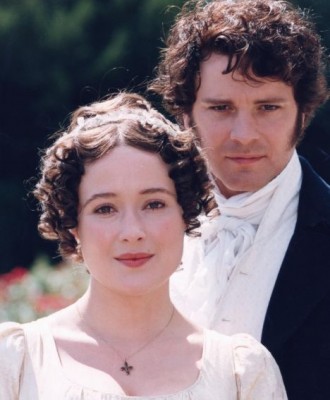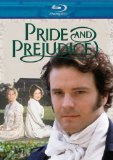| Reviews & Columns |
|
Reviews DVD TV on DVD Blu-ray 4K UHD International DVDs In Theaters Reviews by Studio Video Games Features Collector Series DVDs Easter Egg Database Interviews DVD Talk Radio Feature Articles Columns Anime Talk DVD Savant Horror DVDs The M.O.D. Squad Art House HD Talk Silent DVD
|
DVD Talk Forum |
|
|
| Resources |
|
DVD Price Search Customer Service #'s RCE Info Links |
|
Columns
|
|
|
Pride and Prejudice
But equally impressive, almost shockingly so, is the high-definition picture. Pride and Prejudice was shot in (Super) 16mm, a film gauge rarely used in American television but quite common throughout the world during the 1960s-'90s. One would expect something filmed in 16mm and formatted for 16:9 widescreen to look pretty dicey at best, with a distractingly high level of grain and myriad other problems.
Incredibly though, Pride and Prejudice looks simply gorgeous. Yes, you can still tell it was made in 16mm, but the restoration work far exceeds all expectations. The usually faded, greenish pallet of most British 16mm shows is replaced here by bright vivid colors comparable to a Merchant-Ivory production. In short, it looks like a movie. The level of detail and subtlety of contrast is extremely impressive. I had pretty much assumed anything filmed in 16mm wouldn't appreciably benefit from a high-definition transfer. I was wrong. If shows like Pennies from Heaven and The Singing Detective, the Jeremy Brett Sherlock Holmes series and Poirot (to cite some personal favorites) can look this good, Pride and Prejudice may just help open a vast new high-def market for similar programs.
Faithfully adapted from Jane Austen's 1813 novel, this production runs more than five hours, six 53-minute episodes, and as such is able to delve deeply into Austen's characters in ways a feature film could not. Series producer Sue Birtwistle describes the book as "all about sex and money," and the series reflects this attitude quite well.
Wealthy Charles Bingley (Crispin Bonham-Carter, a distant cousin of Helena) rents an estate close to the rustic village of Meryton near Hertfordshire for the summer. To the grief of calm Mr. Bennet (Benjamin Whitrow), Bingley's arrival causes no end of excitement for the excitable Mrs. Bennet (Alison Steadman), who sees this as a great opportunity to begin marrying off her five daughters: Jane (Susannah Harker), the eldest and most classically beautiful; the independently-minded, intelligent Elizabeth (Jennifer Ehle); the homely and disagreeable Mary (Lucy Briers); and the younger, more carefree daughters Kitty (Polly Maberly) and Lydia (Julia Sawalha).
To the delight of Mrs. Bennet - and in spite of the matriarch's embarrassing behavior - Jane and Mr. Bingley immediately hit it off, but there are some problems. Mr. Bingley is accompanied by the darkly handsome but aloof and prideful Mr. Darcy (Colin Firth), whom the family, especially Elizabeth, takes an instant dislike to, despite rumors that he's fabulously wealthy. Further, presumptuous and sycophantic Mr. Collins (David Bamber) has designs on an appalled Elizabeth, while Jane's relationship with Mr. Bingley inexplicably stalls. But there's little doubt all will be right with the world by the end of the final episode.
Though adapted for television numerous times in the past, the 1995 Pride and Prejudice was the first to break away from the videotaped, stage-bound world of the BBC, telling its story with the advantages of long-form television, but with the added leeway of a more cinematic style of storytelling. To this end, Birtwistle and teleplay writer Andrew Davies emphasize Austen's views on the British class system (and its snobbery among the elite, the mad jockeying for position by those just below them in status), and the use by early 19th century women of their individual talents (in music, dance, recitation, etc.) and physical attractiveness to manipulate and attract desirable men.
The result is a charming, literate series full of characters that are believable in the story's period setting, but which also have relevance in the modern world. This is particularly true with Elizabeth, whose modern attitudes may account for her enduring popularity as one of the western world's most popular literary characters.
The acting is uniformly excellent, with the performers clearly having studied Austen's characters carefully, each bringing out its essence. The film made Colin Firth (Bridget Jones's Diary) a star; the series was a blockbuster success in Britain, its last episode drawing something like 40% of the viewing audience and Firth became something of a sex symbol there for a time. But the entire cast is terrific, especially Ehle's spirited Elizabeth, Whitrow's long-suffering yet always serene Mr. Bennet, and Briers' unhappy Mary. The music by Carl Davis (The World at War, Hollywood) is another standout.
Video & Audio
If you skipped the above section - and why would you want to do that? - the reader will want to go back to the top of this review for my effusive comments about the Super 16-to-high-def transfer.
The 1080p transfer is on two 25GB discs, with the first four episodes on Disc 1, and the last three plus all the extra features on Disc 2. The entire series is formatted for 16:9. Not having seen it before, I'm not aware if it originally aired that way, or if it was photographed with 16:9 framing in mind, but possibly not. Whichever the case, the widescreen image here looks great, and never once seemed awkwardly framed. Generally I'm against reformatting 4:3 shows to 16:9, but it undeniably works here and has on a few other shows, like the Blu-ray presentation of Lonesome Dove.
(Note: Reader Mike Wallster kindly emailed me this link to DVD Beaver's illustrative review of the UK Blu-ray, adding, "it looks like it's been ever so slightly cropped top and bottom, but the sides reveal more than the old DVD." The screen shots certainly offer a startling contrast! Thanks, Mike.)
The audio is also quite impressive. Though only PCM 2.0 stereo, its musical score and directional sound effects are quite impressive, given the audio's limitations. It does not do the amazing transfer a disservice. Optional English subtitles are included.
Extra Features
Many of the supplements are ported over from a September 2006 10th Anniversary Edition. They include (in standard definition) an hour-long documentary about the series, Lasting Impressions, which is very detailed and goes into considerable detail about all phases of the production. Numerous cast and crew members are interviewed, though regrettably neither Firth nor Ehle.
An Impromptu Walkabout with Adrian Lukis and Lucy Briers has the two actors (Lukis having played the devious George Wickham) revisiting some of the film's locations. Turning Point discusses the adaptation and its impact, and features an interview with television critics and dramatist Andrew Davies.
New to home video and in high-definition is Uncovering the Technical Restoration Process, which clearly explains the process of transferring A-B roll Super 16 negative to high-definition and its challenges, and it debunks several myths about the desirability of 16mm in high-definition, such as how machine noise can deceptively appear as grain in a transfer. Fascinating stuff.
Parting Thoughts
This is a great series with an amazing transfer certain to open a lot of eyes with its shockingly good clarity and color. A must-see, and a DVD Talk Collector's Series title.
Film historian Stuart Galbraith IV's latest book, The Toho Studios Story, is on sale now.
|
| Popular Reviews |
| Sponsored Links |
|
|
| Sponsored Links |
|
|
| Release List | Reviews | Shop | Newsletter | Forum | DVD Giveaways | Blu-Ray | Advertise |
|
Copyright 2024 DVDTalk.com All Rights Reserved. Legal Info, Privacy Policy, Terms of Use,
Manage Preferences,
Your Privacy Choices | |||||||















